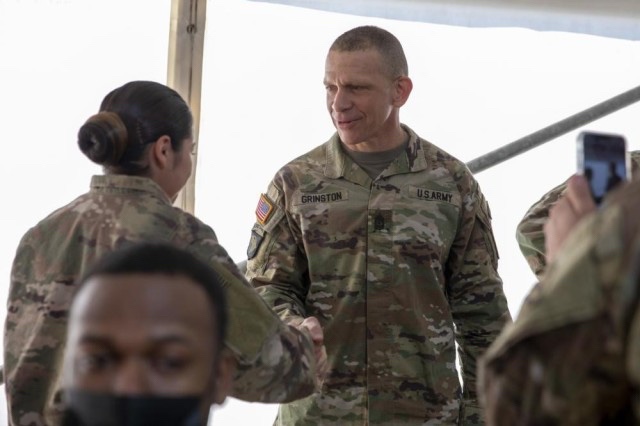
ARLINGTON, Va. — By raising the standards of its physical assessment tests and Basic Leader Course, the service will continually challenge its Soldiers resulting in more successful missions, the Army’s top enlisted leader said.
Sgt. Maj. of the Army Michael A. Grinston, speaking during an Association of the U.S. Army meeting Feb. 14, praised Soldiers for their ongoing efforts on one such mission, supporting the conflict in Ukraine.
To allow Army leaders to focus on the larger battle picture, Grinston said Soldiers at the squad level must be proficient in battle drills, land navigation and basic first aid.
“If you don’t know how to stop a Soldier from bleeding, it doesn’t matter if you’re in large-scale combat or counterinsurgency, you don’t know how to do your tasks,” Grinston said. “At the battalion and below, you need to be an absolute expert in your job. Every Soldier in your organization needs to know their job so well that we shouldn’t have to worry about that. [Then] we can worry about the deep fight and long-range hypersonics.”
The Expert Infantryman Badge, which distinguishes Soldiers who demonstrate excellence or proficiency in infantry skills, and the Expert Soldier Badge and the Expert Field Medic Badge form the EIB3.
To qualify for the EIB, Soldiers must complete a new physical assessment test.
During the qualification, Soldiers must don operational camouflage pattern uniforms and helmets, run for one mile, perform pushups and sprints, and push through a sandbag course. Then Soldiers must complete a high crawl, perform a series of exercises with a partner, run a designated distance while carrying weights and finally, Soldiers will finish another one-mile run.
Grinston said the service plans to reward Soldiers who maintain a high level of physical fitness. Soldiers who score 540 or higher on the Army Combat Fitness Test will be exempt from the body composition measurements with a directive expected to be published in March, Grinston said. Soldiers can score a maximum of 600 on the exam.
Additionally, Grinston announced last year that the service will bring land navigation qualification back to the Basic Leader Course.
“What we need to do is continuously challenge our NCOs,” Grinston said. “So that’s one of our biggest changes; make our first NCO course rigorous and bring back a little rigor and field time and the tactics.”
Grinston lauded the efforts of Soldiers who deployed in support of the war in Ukraine, crediting Army units’ swift response times and ability to carry out logistics support to the Ukrainian military.
Within seven days of the Feb. 24 Russian invasion of the Eastern European country, the 1st Armored Brigade Combat Team, 3rd Infantry Division deployed to Grafenwoehr, Germany, where they test fired tanks and Bradley Fighting Vehicles, Grinston said. The brigade deployed on short notice after completing a tour in South Korea.
“When Russia invaded Ukraine, your Army knew exactly what we needed to do,” Grinston said. “You should be proud of what we’ve done.”
The 82nd Airborne Division completed its fourth no-notice deployment to Europe to aid the Ukrainian military. Last month the Defense Department announced that it would send 90 Stryker armored combat vehicles to assist the Ukrainian military.
In January Grinston visited Soldiers at Grafenwoehr to watch Army units conducting air defense training with Bradleys. Members of the National Guard have trained and mentored Ukrainian Soldiers.
“The Ukrainians have a huge will to fight,” Grinston said. “Whether it’s air defense, Bradleys or medical [training], they were really motivated so they could get back into the fight. I’m extremely proud of the Ukrainians and what they’re doing. But I’m also extremely proud of our Soldiers at getting rallied around that mission and doing anything asked of them.”
By Joe Lacdan, Army News Service


“At the battalion and below, you need to be an absolute expert in your job…”
interesting choice of words.. the corollary being that we recognize upper middle management is a bunch of tools?